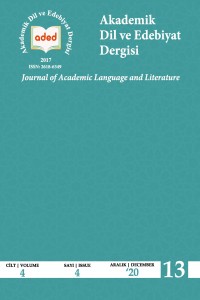Araştırma Makalesi
Yıl 2020,
Cilt: 4 Sayı: 4, 747 - 771, 30.12.2020
Öz
The philosophy of existentialism (exoticism), whose first sparks emerged in the middle of the 19th century, essentially questions the meaning of existence. According to this philosophy, human existence is free and human existence precedes its essence. This trend started to be influential first in Western literature and then in Turkish literature, especially after the Second World War.
In the works of Leyla Erbil, one of the representatives of the 1950 generation of Turkish literature, the traces of the philosophy of existentialism are intensely followed. Especially in the novel Cüce, published in 2001 by the same author, phenomena described by the relevant thought movement are featured. In this article, the existential facts determined in Leyla Erbil's novel called Cüce, which consists of ontological inquiries of the main character Zenîme; Anxiety, self, escape, nothingness, sexuality, alienation and death were determined and analyzed and evaluated in the light of the philosophical views of existentialist philosophers and writers such as Jean-Paul Sartre, Simone de Beauvoir, Sѳren Kierkegaard, Samuel Beckett, Albert Camus and, Martin Heidegger. Thus, with an inductive method, the position of existentialism philosophy in Leyla Erbil's understanding of literature was determined based on the novel Cüce, and the commonality of the purpose of understanding “human” in the relationship between literature and philosophy was once again revealed.
Anahtar Kelimeler
Kaynakça
- Barrett, William(2003). İrrasyonel İnsan. Çev. Salih Özer, Ankara: Hece Yayınları.
- Cevizci, Ahmet(1999). Felsefe Sözlüğü. 3. bs., İstanbul: Paradigma Yayınları.
- Coetzee, John Maxwell(2017). “Samuel Beckett’e Bakmanın Sekiz Yolu, Samuel Beckett”, Adlandırılamayan. Çev. Elif Gökteke, İstanbul: Kırmızı Kedi Yayınevi.
- Colette, Jacques(2006). Varoluşçuluk. Çev. Işık Ergüden, İstanbul: Dost Kitabevi Yayınları.
- De Beauvoir, Simone (1964). İkinci Cins. Çev. Orhan Suda, İstanbul: Düşün Yayınevi.
- Erbil, Leyla(2017). Cüce. 5. bs., İstanbul: Türkiye İş Bankası Kültür Yayınları.
- Erbil, Leyla(2010). Zihin Kuşları. 3. bs., İstanbul: Türkiye İş Bankası Kültür Yayınları. Foulquie, Paul(1991). Varoluşçuluk. Çev. Yakup Şahan, İstanbul: İletişim Yayınları. Gül, Fikri(2004). “Varoluşçu Felsefenin Türk Düşünce Hayatındaki Yansımaları”, Pamukkale Üniversitesi, Sosyal bilimler Enstitüsü Dergisi, Sayı: 18, s. 27-32. Heidegger, Martin(2008). Varlık ve Zaman. Çev. Kaan Ökten, İstanbul: Agora Kitaplığı.
- Kierkegaard, Sѳren(2017). Korku ve Titreme. Çev. Nur Beier, İstanbul: Pinhan Yayıncılık.
- Kurt, Mustafa(2009). “Varoluşçuluğun Türk Edebiyatına Girişi ve İlk Etkileri”, Gazi Türkiyat Dergisi, Bahar 4, s. 139-154.
- Mounier, Emmanuel(1986). Varoluş Felsefelerine Giriş. Çev. Serdar Rifat Kırkoğlu, İstanbul: Alan Yayıncılık.
- Sartre, Jean Paul(1964). Bulantı. Çev. Selahattin Hilav, İstanbul: Ataç Yayıncılık.
- Sartre, Jean Paul(2009). Varlık ve Hiçlik. Çev. Turhan Ilgaz ve Gaye Çankaya Eksen, 4. bs., İstanbul: İthaki Yayınları.
- Sartre, Jean Paul(1996). Varoluşçuluk. Çev. Asım Bezirci, 12. bs., İstanbul: Say Yayınları.
- Şen, Cafer(2010). Türk Romanında Felsefi Açılımlar. Ankara: Akçağ Yayınları.
Yıl 2020,
Cilt: 4 Sayı: 4, 747 - 771, 30.12.2020
Öz
İlk kıvılcımlarını 19. yüzyılın ortalarında gösteren varoluşçuluk felsefesi (egzistansiyalizm), esas itibarıyla varoluşun anlamını sorgular. Bu felsefeye göre, insan varlığı özgürdür ve insanın varoluşu özünden önce gelir. Bu akım, özellikle İkinci Dünya Savaşı’nın ardından, önce Batı edebiyatında daha sonra Türk edebiyatında tesirli olmaya başlar.
Türk edebiyatının 1950 kuşağının temsilcilerinden Leyla Erbil’in eserlerinde varoluşçuluk felsefesinin izleri, yoğun biçimde takip edilir. Yazarın bilhassa 2001 yılında yayımladığı Cüce adlı romanında söz konusu düşünce akımının sınırlarını çizdiği fenomenler ön plana çıkar. Bu makalede Leyla Erbil’in, ana karakter Zenîme’nin ontolojik sorgulamalarından meydana gelen Cüce romanındaki bunaltı, benlik, kaçış, hiçlik, cinsellik, yabancılaşma ve ölüm gibi varoluşsal fenomenler tespit edilip Jean Paul Sartre, Simone de Beauvoir, Sѳren Kierkegaard, Samuel Beckett, Albert Camus ve Martin Heidegger gibi varoluşçu filozof ile yazarların felsefi görüşleri ışığında tahlil edilip değerlendirilir. Böylelikle tümevaran bir yöntemle, Cüce romanından hareketle Leyla Erbil’in edebiyat anlayışında varoluşçuluk felsefesinin konumu belirlenir ve edebiyat-felsefe ilişkisinde “insan”ı anlamak ile anlatmak amacının ortaklığı bir kez daha gözler önüne serilir.
Anahtar Kelimeler
Destekleyen Kurum
İstanbul Üniversitesi Sosyal Bilimler Enstitüsü Türk Dili ve Edebiyatı Anabilim Dalı Yeni Türk Edebiyatı Bilim Dalı
Teşekkür
Yüksek Lisans tezimden meydana getirdiğim bu makaleye katkılarından dolayı tez danışmanım, İstanbul Üniversitesi Türk Dili ve Edebiyatı Bölümü Öğretim Üyesi İsmail Karaca'ya teşekkürlerimi sunarım.
Kaynakça
- Barrett, William(2003). İrrasyonel İnsan. Çev. Salih Özer, Ankara: Hece Yayınları.
- Cevizci, Ahmet(1999). Felsefe Sözlüğü. 3. bs., İstanbul: Paradigma Yayınları.
- Coetzee, John Maxwell(2017). “Samuel Beckett’e Bakmanın Sekiz Yolu, Samuel Beckett”, Adlandırılamayan. Çev. Elif Gökteke, İstanbul: Kırmızı Kedi Yayınevi.
- Colette, Jacques(2006). Varoluşçuluk. Çev. Işık Ergüden, İstanbul: Dost Kitabevi Yayınları.
- De Beauvoir, Simone (1964). İkinci Cins. Çev. Orhan Suda, İstanbul: Düşün Yayınevi.
- Erbil, Leyla(2017). Cüce. 5. bs., İstanbul: Türkiye İş Bankası Kültür Yayınları.
- Erbil, Leyla(2010). Zihin Kuşları. 3. bs., İstanbul: Türkiye İş Bankası Kültür Yayınları. Foulquie, Paul(1991). Varoluşçuluk. Çev. Yakup Şahan, İstanbul: İletişim Yayınları. Gül, Fikri(2004). “Varoluşçu Felsefenin Türk Düşünce Hayatındaki Yansımaları”, Pamukkale Üniversitesi, Sosyal bilimler Enstitüsü Dergisi, Sayı: 18, s. 27-32. Heidegger, Martin(2008). Varlık ve Zaman. Çev. Kaan Ökten, İstanbul: Agora Kitaplığı.
- Kierkegaard, Sѳren(2017). Korku ve Titreme. Çev. Nur Beier, İstanbul: Pinhan Yayıncılık.
- Kurt, Mustafa(2009). “Varoluşçuluğun Türk Edebiyatına Girişi ve İlk Etkileri”, Gazi Türkiyat Dergisi, Bahar 4, s. 139-154.
- Mounier, Emmanuel(1986). Varoluş Felsefelerine Giriş. Çev. Serdar Rifat Kırkoğlu, İstanbul: Alan Yayıncılık.
- Sartre, Jean Paul(1964). Bulantı. Çev. Selahattin Hilav, İstanbul: Ataç Yayıncılık.
- Sartre, Jean Paul(2009). Varlık ve Hiçlik. Çev. Turhan Ilgaz ve Gaye Çankaya Eksen, 4. bs., İstanbul: İthaki Yayınları.
- Sartre, Jean Paul(1996). Varoluşçuluk. Çev. Asım Bezirci, 12. bs., İstanbul: Say Yayınları.
- Şen, Cafer(2010). Türk Romanında Felsefi Açılımlar. Ankara: Akçağ Yayınları.
Toplam 14 adet kaynakça vardır.
Ayrıntılar
| Birincil Dil | Türkçe |
|---|---|
| Konular | Edebi Çalışmalar |
| Bölüm | Araştırma Makalesi |
| Yazarlar | |
| Yayımlanma Tarihi | 30 Aralık 2020 |
| Gönderilme Tarihi | 16 Eylül 2020 |
| Kabul Tarihi | 26 Kasım 2020 |
| Yayımlandığı Sayı | Yıl 2020 Cilt: 4 Sayı: 4 |
Akademik Dil ve Edebiyat Dergisi Atıf-GayriTicari 4.0 Uluslararası lisansı ile lisanslanmıştır.
This work is licensed under Attribution-NonCommercial 4.0 International

